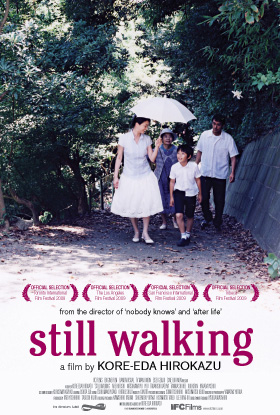Still Walking
 Still Walking (Aruitemo Aruitemo)
Still Walking (Aruitemo Aruitemo)
Directed by: Hirokazu Koreeda Cast: Hiroshi Abe, Yui Natsukawa, Kirin Kiki Running Time: 1 hr 55 mins Rating: Unrated Release Date: December 11, 2009
PLOT: A family comes together to commemorate the anniversary of the death of the eldest son, Junpei. Over the course of the night and day, the family members learn about one another and themselves.
WHO'S IT FOR? Koreeda's made some great films in the last decade, including After Life and Nobody Knows. Fans of those films or anyone else interested in well-crafted dramas should enjoy this film.
EXPECTATIONS: I enjoyed the two films mentioned above, so I was hoping for something similarly well-written and beautiful.
SCORECARD (0-10)
ACTORS:
Hiroshi Abe as Ryota: The younger brother of a dead sibling he can never live up to, Ryota's reluctant to return to his family's home. Soon it becomes clear that though everything seems fine on the surface, there are lingering frustrations and disappointments in his familial home that Ryota's eager to avoid. Abe plays him as a good guy, though not one who always understands the subtext of what's going on. Who he is and who his parents want him to be are two different, things, well three different things since each parent seems to demand different attributes. The strength of this film lies in Koreeda's ability to show different aspects of each character when they interact with different people. There's a scene between Ryota and his mother that's really amazing and beautifully done. It's a nice performance. Score: 7
Yui Natsukawa as Yukari: Ryota's wife is new to the family though she brings a little baggage in the form of her son, Atsushi. Being remarried seems to be some sort of social stigma, Ryota's parents seem to think that he could have done better. Natsukawa plays the wife as someone trying to get along, but not unaware of the situation. She seems to be the most knowledgeable about Toshiko, Ryota's mother, who seems like a nice person and good hostess but has deep seated resentments. Maybe it's because they're similar, both doting on a son. Though admittedly, Yukari's is younger and probably needs her more than Ryota's. She doesn't really come into her own till the end of the film, but she's pretty great. Score: 8
Kirin Kiki as Toshiko: As matriarch, Toshiko plays hostess to her children, their spouses and children on a day that seems to hurt her more than anyone else present. She still feels the loss of Junpei the hardest, which she speaks of openly. But she's also kind of a bitchy old lady, talking smack about her daughter when she leaves and subtly insulting her daughter-in-law. Not to mention a bombshell she drops on her husband later in the evening, though it's maybe the most discreet bombshell you will ever see in a movie. Kiki has a film career that stretches back four decades and she gives a very accomplished performance. She plays Toshiko as a very complicated woman, and one I respected by the end of the film. Score: 9
TALKING: Koreeda also wrote the script and he has a way with dialogue. I started watching the film without reading the synopsis so it took me awhile to figure out what was going on, the film's like a mystery where I'm trying to figure out who each character was in the relation to the others. The information is all there, you just need to listen and pay attention. The rewards for doing so make it worth it. Score: 9
SIGHTS: Not quite as beautiful as Nobody Knows, Still Walking takes place in a seaside town, though the film exists in only a small part of it. The cinematography is more interesting for the intimate way the family members are shot in the home. Score: 8
SOUNDS: There's one song that's kind of great, though I imagine it was a pop hit in Japan in the '70s or something. Otherwise, just a delicate score. Score: 7
PLOT SPOILERS
BEST SCENE: My favorite scene had Toshiko telling Ryota why she invites the boy Junpei saved over to her home every year. The way she can admit to malice was pretty impressive and cast her in a new light for me.
ENDING: There is sort of a denouement that ends up adding an extra layer to the film, but it's very subtle.
QUESTIONS: Can any family heal after the death of a child? Even if the child is an adult?
REWATCHABILITY: I think I'd watch the film differently a second time, if only because I have a better idea of who the characters really are and want to see if I notice differences in their behaviors.
OVERALL
Still Walking starts small and it took a little time for me to get really into it. Still, I did get hooked and really enjoyed the film. Koreeda mentioned that he wanted to make a film that focused not on a big event, but what happens after those events. This is a family that's settled, it's fifteen years since the death of Junpei and everyone's together, including grandchildren. But still there are currents of unrest and as the day goes on, they sort of ebb and flow. Ryota trying to connect with his father, Toshiko trying to please and manipulate her children, Yukari trying to stay afloat.. everyone has goals. It's a film with a lot of protagonists who have very small, insular goals, that feels much bigger than it is. Koreeda's just a really interesting filmmaker, I look forward to seeing what he does next.
FINAL SCORE: 9/10